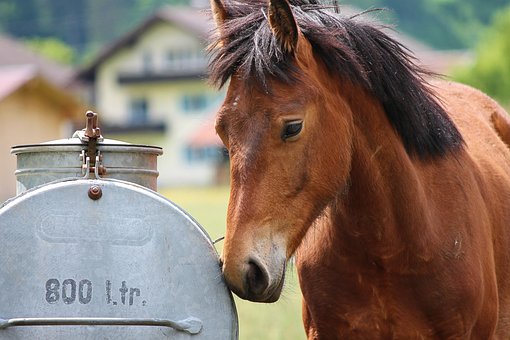Dehydration in horses is a very serious subject and can significantly affect the health, performance and well-being of your horse. At its most serious, dehydration in horses can be life-threatening. Let’s take a look at the various ways dehydration can affect your horse.
How Dehydration in Horses Occurs
Before we commence with the article, let’s quickly discuss how dehydration occurs in horses. Dehydration most commonly occurs in horses when there is an excessive loss of water in a horse’s body – usually through sweating caused by strenuous exercise, or long bouts of diarrhoea. If the loss of water and electrolytes – minerals like sodium and potassium – are not quickly replaced and the horse rehydrated, your horse can become seriously unwell, with dehydration eventually leading to kidney failure.
Your Horse’s Skin Loses its Elasticity
When your horse is hydrated, his skin will spring back into place after a gentle pinch. However, a dehydrated horse’s skin will lose its elasticity, causing the skin to stand up in a ridge after a gentle pinch. An easy way to decipher whether your horse is dehydrated or not is to pinch his skin gently and see what effect it has.
Your Horse Will Become Very Lethargic
Lethargy is a common sign of dehydration in horses. Horses are very alert and active animals, so it is generally easy to spot signs of lethargy. A lethargic horse will become sleepy, slow moving, drowsy and will generally avoid eating. If you notice that your horse is exhibiting signs of lethargy, it is important to offer him water immediately and provide a quiet, cool space for him to rest and regain his energy.
Dullness and Dryness in Your Horses Eyes
Typically, a horse’s eyes are moist and alert. However, when a horse is dehydrated, his eyes become dull and dry very quickly. When a horse has dry eyes, he experiences discomfort and may become easily distressed. So, if your horse has noticeably dry eyes, you must encourage him to hydrate as quickly as you can to help fix the problem.
Dehydration in Horse Causes Sweating
Sweating in horses can be problematic as your horse loses electrolytes (those oh-so-precious body salts) and these need to be replaced. If your horse sweats a lot and is not replacing his body salts by rehydrating, we will become severely dehydrated very quickly and his performance will be affected. If your horse does not get water quickly, he may collapse.
Loss of Appetite is Common
A dehydrated horse will lose his appetite and eat significantly less than usual. When your horse is dehydrated, it is very likely he will avoid all feed and instead only be interested in feeding on grass – as its made up mostly of water. If you notice your horse has lost his appetite, encourage him to drink water by placing water buckets within easy reach of him.
If You Suspect Your Horse is Dehydrated
If your horse is dehydrated and you suspect it is a serious problem, it is important to seek out the medical advice of your vet. Your vet may carry out a simple skin test to gain a better insight into just how dehydrated your horse really is. It may be that your horse needs to be seen by the vet to ensure he is safe from the dangerous effects of dehydration.
Electrolytes for Horses
If your horse is significantly dehydrated, water alone may not hydrate him fast enough. Only offering water to a dehydrated horse may dilute his electrolyte balance further. Instead, it is recommended, to prevent this imbalance, that you purchase equine oral electrolyte replacement solutions. When it comes to electrolytes and hydration, it is important that you get the right concentration and it’s even more crucial that your horse will take them. So, be sure to seek the advice of your vet.
Keep Your Horse Hydrated
It is extremely important, especially during the summer, that you keep your horse properly hydrated. The best way to do this is to ensure your horse has access to clean water in his stable and while he is out at pasture.
Keeping your horse properly hydrated will ensure he remains healthy, strong and active. If you would like to know more tips for keeping your horse happy, click here.
Alternatively, call Prime Stables today for more information about horse care. Our friendly team would be more than happy to answer any questions you may have. We are experts in horse care and really know our stuff! Put our knowledge to the test and send your questions our way.


